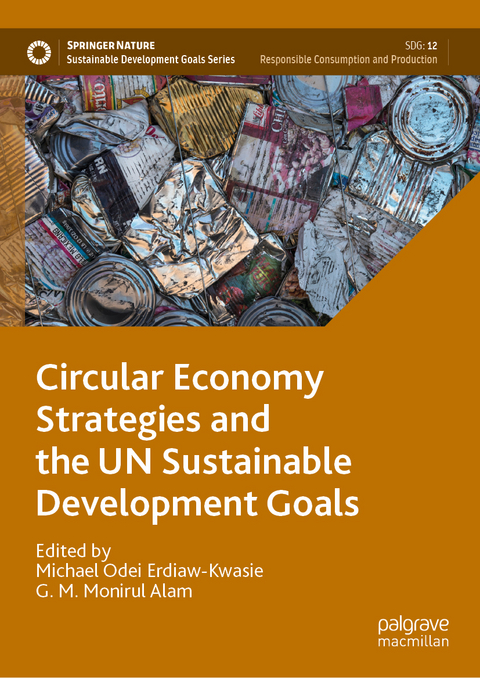
Circular Economy Strategies and the UN Sustainable Development Goals
Springer Verlag, Singapore
978-981-99-3082-1 (ISBN)
- Titel nicht im Sortiment
- Artikel merken
This book provides novel perspectives to the ongoing global discussions on the UN Sustainable Development Goals (SDGs). Current knowledge on circular economy and the SDGs target in developing and emerging countries are mostly fragmented and empirical evidence is limited. The approach taken in the book is unique as it presents holistic viewpoints about the synergies, opportunities and challenges between circular economy and SDGs targets in developing and emerging countries. The book presents diverse contents on the topic including literature reviews, conceptual discussions, case studies, and empirical analysis.
Dr Michael Odei Erdiaw-Kwasie is an award-winning author and Lecturer in the Business and Accounting Discipline at Charles Darwin University. Dr Erdiaw-Kwasie holds a PhD in Sustainability Management from the University of Southern Queensland. His research interests focus on sustainability transitions, circular economy, climate risks & business, digital futures, and global development. Dr G. M. Monirul Alam is currently a Professor at the Department of Agribusiness, Bangabandhu Sheikh Mujibur Rahman Agricultural University (BSMRAU), Bangladesh. He also holds the position of Adjunct Research Fellow at USQ, Australia. He is an award-winning researcher whose current research domains are climate change adaptation, poverty, food security, ICT, circular economy, and impact analysis.
Section 1: Literature review of circular strategies.- Chapter 1 Circularity challenges in SDGs Implementation: A review in context.- Chapter 2 Sharing instead of Owning: A Synthesized Review on Collaborative Consumption in Sub-Saharan Africa.- Section 2: Conceptual insights on circular economy.- Chapter 3 Contextualizing circular economy research-to-practice transition.- Chapter 4 STEAM education and innovation learning towards circular strategies.- Chapter 5 How can Ghana Transition from a Linear to a circular economy of waste management? A conceptual analysis of policy approaches.- Section 3: Country-level case studies on circular strategies.- Chapter 6 Linear economy wolf in circular economy sheep clothing: Ride-hailing in Ghana.- Chapter 7 A transition towards a circular food economy in Ghana: An institutional and policy analysis.- Chapter 8 Macroeconomic performance and progress towards a circular economy in developing countries.- Chapter 9 Circularity in Mauritius: Examining the determinants.- Chapter 10 Circular economy principles and responsible manufacturing: Assessing Implications for resource conservation, emission reduction, cost performance, and environmental legitimacy.- Chapter 11 Human capital transformation for circular economy and sustainable development: A government-linked company experience.- Chapter 12 Applying circular economy thinking to food systems in the hospitality industry in Nigeria.- Chapter 13 Circular economy in Turkish manufacturing sector: The roles of green manufacturing and innovation.- Chapter 14 Corporate sustainability and circular economy in Turkish service and manufacturing business.- Chapter 15 Circular Value Chains: Circular Strategies and Managerial Perceptions of Supply Chain Professionals from Turkey.- Chapter 16 Exploring factors affecting the adoption of green process management model in the software industry: Progress towards sustainability and circularity.- Chapter 17 Capital Maintenance and Depreciation Accounting Convergence: A New Model for Sustainability and Circularity in Capital Maintenance.- Chapter 18 Pathways toward a circular economy in Ghana: The contribution of waste transfer stations and the informal waste collectors in solid waste management.- Chapter 19 Institutionalisation and Enforcement of Circular Fisheries Practices in Uganda: The role of the Military in the Implementation of the National Fisheries Policy.- Chapter 20 Gayo’s sustainable community waste management model: Impacts and lessons for circular futures.
| Erscheinungsdatum | 13.09.2023 |
|---|---|
| Reihe/Serie | Sustainable Development Goals Series |
| Zusatzinfo | 75 Illustrations, color; 17 Illustrations, black and white; XLVI, 674 p. 92 illus., 75 illus. in color. |
| Verlagsort | Singapore |
| Sprache | englisch |
| Maße | 148 x 210 mm |
| Themenwelt | Naturwissenschaften ► Biologie ► Ökologie / Naturschutz |
| Naturwissenschaften ► Geowissenschaften | |
| Sozialwissenschaften ► Pädagogik | |
| Sozialwissenschaften ► Politik / Verwaltung | |
| Technik ► Elektrotechnik / Energietechnik | |
| Wirtschaft ► Volkswirtschaftslehre | |
| Schlagworte | Barriers and triggers of circular economy practices • circular business models • Circular economy and SDGs impacts • circular economy in Africa’s informal sector • Circular Food Economy • Circular/Sustainable food systems • Collaborative Consumption in Sub Saharan Africa • emission reduction in an emerging economy • Food Systems in the Hospitality Industry • Ghana’s ride-hailing industry • Human Capital Transformation for Sustainable Development • Innovation in circular design • Linear-to-circular transitions • Product-to-service design • Rethinking consumer ownership • Supply Chains in health sector • Sustainability in Developing Countries • sustainable business through shared value • Sustainable Resource Use • waste management |
| ISBN-10 | 981-99-3082-0 / 9819930820 |
| ISBN-13 | 978-981-99-3082-1 / 9789819930821 |
| Zustand | Neuware |
| Haben Sie eine Frage zum Produkt? |
aus dem Bereich


